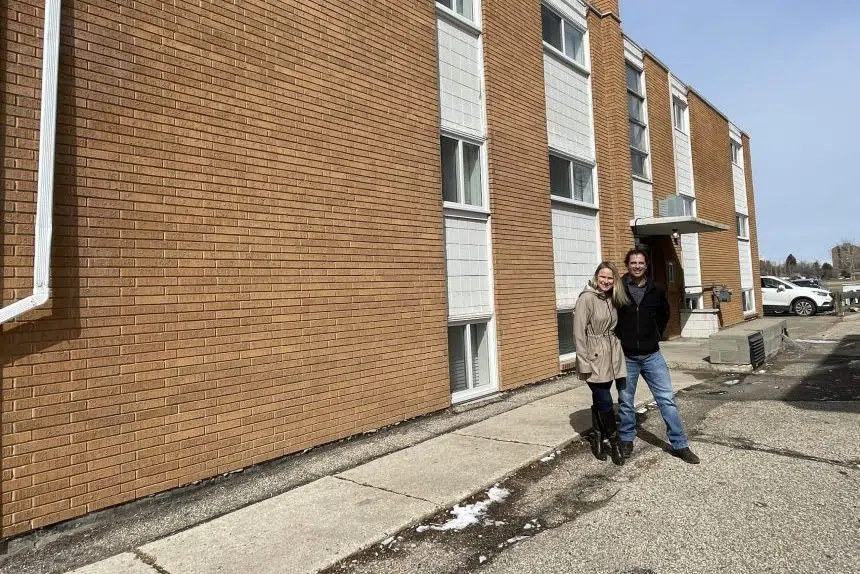The new federal house-flipping tax seems like it will have more of an impact on the everyday person looking to flip a home rather than those who do it for a living.
Fraser and Vanessa Nybo own Nybo Estates, which operates out of Saskatoon. The couple has experience flipping houses, buying multi-family apartment buildings and single-family rentals, and a variety of other real estate matters.
The latest federal budget, announced earlier this month, put forth an anti-flipping tax that would apply to residential properties sold on or after Jan. 1, 2023 within a year of the purchasing date.
Fraser explained the new rule is intended to tax businesses and active income on any principal residence that someone has owned for less than 12 months.
“This is basically to target people that live in a house for a few months and then sell it … and pay zero tax on it,” Fraser said. “The government doesn’t like that and for good reason.”
On average, the Nybos said they’ll buy, renovate and sell a home within four to six months.
The changes coming for the real estate market as a result of the budget are numerous, but won’t have a significant impact on their business.
Because they buy homes with the intent of flipping them within six months and this is part of their business, Fraser said they already pay the higher tax bracket.
“We’ve been paying the taxes this whole time as a company and, as a business, it doesn’t affect us that much,” Vanessa said.
“I think more what (the government is) going after is the personal house-flipper who is looking to buy a house, live in it, renovate it for 11 months and turn around and sell it under the one-year mark,” Fraser explained, adding a lot of people who flip a house themselves won’t claim capital gains on the project.
“They were essentially getting the house tax free.”
Fraser chalked up the rule to the government seeing various problems with housing affordability in more major Canadian centres like Toronto and Vancouver. It has been looking for a solution in the form of different rules.
He says the measures outlined in the budget will essentially close a few real estate loopholes.
While Fraser thinks it’s a good move for the government, he said the real problem lies in Canada’s housing supply, or lack thereof.
“I don’t think (the tax) is the solution. I think, obviously, supply is the issue,” he explained.
High immigration trends and encouraging people to move to Canada coupled with not building enough housing options to accommodate as many people as are coming to the country is creating a shortage of housing in general, with affordability another issue on top of that. Because homes are in short supply, those selling can ask for more and expect to receive it.
Fraser said only about 250,000 dwellings — a number that includes houses, condos and other living spaces — are being built in the country each year.
In the Nybo Estates rental portfolio alone, Fraser said they are 100 per cent full right now.
“It’s a lot of people moving into Saskatchewan, into Canada … and there’s just not enough places for them,” Fraser said.
Vanessa saw another problem with the house-flipping tax. While she understands the goal of the government, she doesn’t think the tax cost is going to be shouldered by the people flipping the home.
Instead, she foresees flippers adding the extra tax amount into their budgeting and increasing the price they list a home for. That way, the money is accounted for, and paid by, the person purchasing the home.
“I would just be scared that it’s the buyer on the other end that’s going to pay for it because it’s not the flipper that’s going to take the hit,” Vanessa said. “Somebody’s going to have to pay for that money.”
“Local people are being priced out of the markets … in bigger centres, so they had to do something,” Fraser added.
He said there are programs in place that are intended to help curtail aggressive rent growth and assist with other housing concerns.
Adding GST and HST to assignments is another move that Fraser attributed to situations in major centres. He said people will put in to buy a house and add a clause to the agreement that they can assign a property, then turn around and find a new buyer to make a profit.
Costs increasing on homes have made the market valuable for sellers and pricy for buyers at the moment.
Many variables exist to further complicate the housing situation facing Canadians, from rising interest rates to construction costs, supply and inflation continuing to fluctuate prices generally.
Fraser said COVID-19 may have had some impact on the current housing market, but he doesn’t think it’s a main driver. Instead, he sees a “pent-up demand” that isn’t being adequately met.
In response to the array of considerations facing those in the market for a new living space, Vanessa noted that while their work isn’t at all like “Love it or List it,” it seems more people have been interested in working to renovate and redecorate their existing homes rather than looking to sell to find their dream space.











